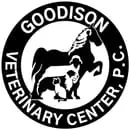- Keep cool. Provide fresh, cold water and shade for pets that are outdoors. In significantly warm weather, bring them inside to a cooler location (in general, use extreme caution if the heat index is over 90 degrees).
- Never leave your pet alone in the car. When it is 72 degrees outside, the temperature inside the car can reach a searing 116 degrees in less than an hour, even with the windows cracked. When it is warmer, this happens much faster and can lead to heat stroke.
- Limit activity. Do not over-exercise your pet in warm weather.
- Know the signs of heat stroke (overheating). Watch for excessive panting, difficulty breathing, drooling, increased heart/respiratory rate, vomiting and/or diarrhea (sometimes bloody), weakness, collapse, seizures, or coma. If you suspect heat stroke, seek veterinary care immediately. This is a medical emergency and can be fatal within a short period of time.
- Is your pet at increased risk of developing heat stroke? Any pet can suffer from heat stroke. Those at increased risk include flat-faced breeds (e.g. Pugs, Shih Tzus, Boxers, Bulldogs, Persian cats, etc.), pets with respiratory or heart problems, pregnant animals, and those that have had heat stroke in the past.
- Special conditions warrant concern. Be especially mindful of your pet's health during humid weather, dusty conditions, or on poor air quality days.
- Beware hot surfaces. Asphalt can burn paws, even on short walks.
- Prevent "high-rise syndrome." This occurs when pets (usually cats) fall from a significant height, resulting in serious injuries or death. Make sure all windows, screens, doors, and balconies are secure and pet-proofed.
- Practice good water safety. Supervise pets around pools and other bodies of water, using floatation devices on boats and as otherwise needed. For pets new to the water, make sure you introduce him or her to water in a positive way with lots of praise and rewards. Water can be FUN! Do a fresh-water rinse off after swimming to help prevent skin irritation and make sure your pet dries thoroughly, even in those hard to reach areas (under the collar, in skin folds, and so on).
- Collar concerns. Take off "invisible fence" collars at night or when not in use. Warm weather increases risk of irritation and/or infection where the collar comes into close contact with the skin.
- Avoid warm weather hazards. Animal poisons (rodent poisons, snail and slug bait, insecticides, etc.), lawn and pool chemicals, snake bites, spider bites, bee stings, blue-green algae in ponds, compost/moldy food (including fruit rotting under trees), cocoa mulch, and some outdoor plants can all pose serious health problems. See the ASPCA's Animal Poison Control Center for more information.
- Calm those nerves. Talk to your veterinarian if your pet experiences thunderstorm or fireworks anxiety. Many treatment options (behavioral therapy and/or medication) can help.
- Forget the fireworks. Keep your pet away from fireworks. Also remember to steer clear of unexploded fireworks on the ground and never pick up (or allow your dog to pick up) tennis balls, ping pong balls, etc. when found outside. Homemade fireworks are sometimes put them and if they do not detonate properly, they might accidentally be triggered to explode by unsuspecting people or pets. Cases like this happen and are incredibly sad.
- Schedule a checkup with your veterinarian. Warm weather increases risk of parasites (heartworms, intestinal parasites, fleas, ticks, ear mites, mange mites, etc.), infectious diseases, allergies and other skin/ear problems, complications from heart and respiratory illness, and so on. Prevention and early identification of disease is key to optimizing your pet's health.
- Make a first aid kit. It's also important to be prepared. See items suggested by the American Red Cross by clicking here.
- Microchip your pet. The increase in outdoor activities during summer months results in more opportunity for pet loss. We use high quality, reliable Home Again microchips. Our staff can provide details upon request.
- Ask questions. We're here to help and hope you and your pets have a SAFE and FUN summer!
Call us today!
Hours
Monday
9 am - 6 pm
Tuesday
9 am - 6 pm
Wednesday
9 am - 6 pm
Thursday
9 am - 6 pm
Friday
9 am - 5 pm
Saturday
9 am - 1 pm
Sunday
Closed
Monday
9 am - 6 pm
Tuesday
9 am - 6 pm
Wednesday
9 am - 6 pm
Thursday
9 am - 6 pm
Friday
9 am - 5 pm
Saturday
9 am - 1 pm
Sunday
Closed

